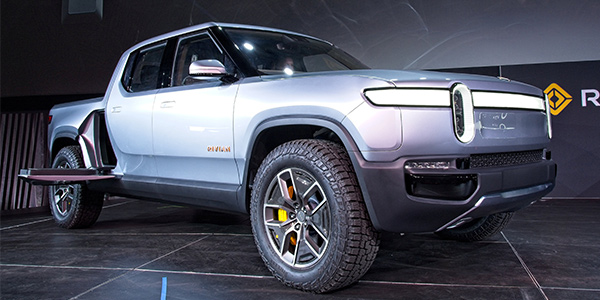By Steve Huntoon

The column showed that electric cars are:
- Uneconomic relative to gasoline cars;
- Contribute more to global warming than gasoline cars; and
- Cause more death and disability than gasoline cars.
All still true today. I included a photo of a 1922 electric car (reprised here) to make the point that electric cars died about a hundred years ago, and they ain’t coming back any time soon (except as niche Veblen goods like Tesla).2
I sent my column to The Wall Street Journal car columnist Dan Neil, who even then was an electric car devotee. No acknowledgement or response. Not that I expected one.
The Band Plays On
It’s timely to reprise this subject because Neil just wrote another fawning piece for electric cars where he claims — without any support whatsoever — that a gasoline car is more expensive than an electric car over a 10-year ownership horizon.3 And that within “the reasonable service life of any vehicle I buy today,” the demand for gasoline cars will be zero. And he trashes the amazing technological improvements of gasoline cars as feeling “junky and compromising.” (I suppose every iPhone enhancement could get such a dissing.)
Irony abounds here because the very next day the WSJ itself ran an editorial arguing that electric cars are very expensive, and the electric car tax credit subsidy is very regressive.4 And that electric cars lose money for their makers and are being made only because of federal and state mandates.
General Motors loses $9,000 on every Chevrolet Bolt. When you lose $9,000 on every electric car, you can’t make it up in volume, especially not on gasoline cars that Neil claims won’t exist anymore.
Paris Agreement
Neil writes that after the Paris climate talks, “most nations of the world have put the IC [internal combustion] vehicle under a death sentence.” This is profoundly false. A mere handful of nations have adopted future — very future — limitations on gasoline cars, and most of those are purely aspirational.5
The reality is this: No nation is going to commit economic harakiri by mandating uneconomic cars for its citizens. Well, except maybe the nation of California.
Piece de Resistance
Now the piece de resistance. Not about electric cars, but electric trucks. Neil extolls a future pickup truck from a company called Rivian that supposedly in two years will be producing an electric pickup with 400-plus miles of range, that will make the gasoline pickup a financial albatross, and that will provide “a wading depth of 3 feet” with which you can go “through the river to grandmother’s house.”
OMG. For starters, Rivian is a company with demonstrated success only in selling investors. Its Wikipedia listing is enlightening.6 Multiple name changes, initial product to be a high MPG (gasoline) car, then autonomous electric vehicles, and now electric pickups.
The pickup per Rivian’s promotion would provide 400 miles of range at the $100,000 price range.7 In the base model, providing 230 (not 400) miles of range, the promoted base price is $69,000.
Here’s a true-false question for those of you playing the electric vehicle game at home.
The base price of the base Rivian is $30,000 more than the price of a similarly configured Ford F-150:
- True.
- False.
The correct answer is True. The base Rivian, with 230 miles of range and a base price of $69,000, is $30,000 more than the price of a similarly configured Ford F-150 (same truck bed, four doors, 4×4) of $39,050.
Did I mention that the truck bed length of the Rivian is said to be 55 inches, while the standard truck bed of the F-150 is 78 inches? Last time I checked, pickup owners cared about how much stuff their pickup could carry.
Now, as for the financial albatross assertion about gasoline pickups, it is true that electricity generally costs less on an MPG-equivalent basis than gasoline. But let’s do a little math.
The Ford F-150 gets 20 MPG. The average annual miles for a pickup is 12,000 miles.8 At the current annual average cost of gas, that’s $1,350 for gas per year (12,000 miles divided by 20 MPG times $2.25/gallon).
Neil talks about a 10-year ownership horizon of a purchase. So that’s $1,350/year for gas times 10 years equals $13,500. Let’s see. That’s $13,500 for gas plus the price of the similar Ford F-150 of $39,050 for a total of $52,550.
Compare the F-150 price plus gasoline of $52,550 with the base price of the range-limited Rivian of $69,000, and assume that electricity for the Rivian is free.9
Any questions on the economics — or practicality? Which — just guessing here — matter big time to pickup buyers.
Finally, there’s Neil’s gushing about a future Rivian’s 3-foot wading depth in rivers. Here’s the term for anyone “wading,” aka “floating,”10 in 3 feet of river water: Foolish. Very foolish.
2- Of course there could be a breakthrough in battery technology/cost, but nothing is on the near-term horizon. https://www.bloomberg.com/news/articles/2019-01-06/before-the-electric-car-takes-over-someone-needs-to-reinvent-the-battery.
3- https://www.wsj.com/articles/think-electric-vehicles-are-great-now-just-wait-11545838139.
4- https://www.wsj.com/articles/the-electric-kool-aid-subsidy-test-11546201813.
6- https://en.wikipedia.org/wiki/Rivian.
8- https://afdc.energy.gov/data/10309.
9- BTW, on top of the regressive income tax subsidy, electric vehicles enjoy tax avoidance from not contributing toward our interstate highway system through the gas tax. Another subsidy.
10- https://weather.com/safety/floods/news/flash-flooding-vehicle-danger-20140717.





